#Mechanized Infantry
Explore tagged Tumblr posts
Text


#miniatures#acrylic#ttrpg art#miniature painting#minipainting#trench crusade#new antioch#mechanized infantry#flamethrower#trench lighter
15 notes
·
View notes
Text
Point Zulu X-ray Charlie, Position Quebec Foxtrot Golf.
</>DOEas anyObe copy!? Overk?!#)+kj</>
</>tHdzis ihYntz Xia-3-2! Half of our pErtzyohnelle hrre are dead! Requesting innediate Sa asstz atzossoistzahntzhynvithviyhn#;;#--<! How cokopu,iyhn, over?!</>
</>doEs any notheRfvuckhyingh persontzelhynviyhn on tdzisz nyhent kopiy!?</>
</>vEre veing being overrun! We need help hyelpnn nauw!3¡!!!</>
#Overrun#Xiao-3-2#xanxon#unreal#unreality#xanxoni#Battle#Mechanized infantry#Position#Point#Assassinatiyorhhyn#Rasio#A radjiyohn radjiyouh hehyn viyhn rassiyouhn rassiyo v hehyn xiao juliyrttah vvh v hehyn
3 notes
·
View notes
Text
Book 42 of 2024 (★★★)

Title: Heavy Metal: Memoir of a distant war Authors: Edward Roby
ISBN: 9783347130500 Rating: ★★★ Subject: Books.Military.20th-21st Century.Asia.Vietnam War.Armor
Description: This is the story of an armored infantry company in action north of Saigon during the phase the Vietnam War spanning the Tet offensive. The narrative unfolds from the vantage point of a young infantry captain who commanded Company C, Second Battalion, Second Infantry Regiment in the First Infantry Division from late September 1967 through the end of April 1968. 'Heavy Metal' spotlights the central role of armored vehicles as fast-moving gun platforms in the deployment of his mechanized infantry soldiers. Apart from combat actions, the book describes a soldier's everyday life in fortified field positions, the defense of the division's forward base at Lai Khe, the company's decimating outbreak of falciparum malaria and the inevitable accidents with explosive ordinance. This is the story of an armored infantry company in action north of Saigon during the phase the Vietnam War spanning the Tet offensive. The narrative unfolds from the vantage point of a young infantry captain who commanded Company C, Second Battalion, Second Infantry Regiment in the First Infantry Division from late September 1967 through the end of April 1968. 'Heavy Metal' spotlights the central role of armored vehicles as fast-moving gun platforms in the deployment of his mechanized infantry soldiers. Apart from combat actions, the book describes a soldier's everyday life in fortified field positions, the defense of the division's forward base at Lai Khe, the company's decimating outbreak of falciparum malaria and the inevitable accidents with explosive ordinance.
My Review: Meh… nothing really happens, nothing is really gained by this book except to learn more about how NDP's are set up and the famous Hay's Holes.
#Book#Books#Ebook#Ebooks#Booklr#Bookblr#History#Military History#NonFiction#War#Vietnam War#Mechanized Infantry#mech infantry#US Army#1st infantry division#Lai Khe
0 notes
Text

Ukrainian infantry soldiers of the 23rd Mechanized Brigade, Avdiivka, Donetsk region, Ukraine, 2024 - by Roman Pilipey, Ukrainian
70 notes
·
View notes
Text
my caves of qud character getting gender euphoria from opening their sheet and seeing chrome "hardpoint" equip slots
#its so fun how u can start thee game as a human#and by mid-late game b something more akin 2 a mechanized infantry vehicle
7 notes
·
View notes
Text
Book 36 of 2024 (★★★)

Title: The Platoon Commander Authors: John O’Halloran
ISBN: 9780733647475 Rating: ★★★ Subject: Books.Military.20th-21st Century.Asia.Vietnam War.Australia
Description: John O'Halloran was a country boy from Tamworth, NSW, who was called up for national service not long after the start of the Vietnam War. As a tough and determined 21-year-old, he guided 6 RAR's B Company 5 Platoon through some of the biggest conflicts of the war, including Operation Hobart and the Battle of Long Tan. But he faced his hardest military challenge at Operation Bribie, leading a fixed bayonet charge against a deadly Viet Cong jungle stronghold. The Platoon Commander is an unmissable and devastating first-hand account of the realities and brutalities of war, and especially this war fought in jungles, not trenches, which would go on to bitterly divide Australians. O'Halloran's sense of duty and strong character carried him and his men through fierce battles and uncertainty. His sense of humour kept him going through the years afterwards. His indomitable spirit inspired the men of 5 Platoon to fight against the odds to achieve the mission - no matter how treacherous - and even away from the action and in the many years since O'Halloran kept the respect of his men. Now regarded by many of his peers as a national treasure, John Patrick Joseph O'Halloran has been quoted in almost every important book written about Australia's involvement in the Vietnam War, yet has never told his own remarkable story. Until now.
#Book#Books#Ebook#Ebooks#Booklr#Bookblr#History#Military History#NonFiction#War#Vietnam War#Australian Army#Nui Dat#Mechanized Infantry#Battle of Long Tan
0 notes
Link
The article "Japanese Type 100 Submachine Gun — Too Few and Too Late," authored by Tom Laemlein, explores the Japanese Type 100 submachine gun and its delayed production during World War II. The article details Japan's initial lack of interest in submachine guns during the 1930s, and how, despite eventually manufacturing the Type 100 in 1944, they missed the opportunity to effectively compete with other nations' short-range firepower. The article traces the history of submachine guns, highlighting the influence of the .45 caliber Thompson and European models, the development of a simplified Bergmann-type submachine gun by Japan, and the evolution of the Type 100 through various models such as the paratrooper version with a folding stock. Despite efforts to update and improve the gun, it was ultimately limited by production constraints and the underpowered 8x22mm Nambu round. The Type 100 remains a historically interesting weapon but was not on par with other submachine guns of World War II.
#Japanese Type 100 submachine gun#World War II#Imperial Japanese Army#firearm design#submachine guns#military weapons#Kenjiro Nambu#semi-automatic fire#Nambu Type 14 pistol#8x22mm Nambu cartridge#lighter#shorter barrel#T100 magazine#bolt mechanism#Japanese infantry#Type 100/40 model#late-war Type 100/44#paratroopers#muzzle brake#fixed stock design#Japanese military history#weapon manufacturing#Tokyo Arsenal#ordnance.
0 notes
Text
Civ, what do you Mean I lose???? I play for Ten Hours and come within 3 turns of science victory and all I get is, "You lose, next!"
Fucks ache.
#i hate sid meier i wanna blast him into space without a spacesuit (affectionate)#my boy trajan gonna mechanized infantry him back to the classical era
0 notes
Text
Babylon's 6 D&D Tips
I DM’d D&D for ten years. I started in middle school, and I kept it up until my sophomore year of college. This is my mini-guide for what the game is, what it isn’t, and how to play it well. So. From the top.
Tip 1: Don't make your main storyline time dependent.
D&D is an amazing open-world experience. You can pick at any detail. Nothing is a non-interactable part of the scenery. If there’s a sewer manhole, you can lift it up and climb down. If there’s a house, you can look inside and rob it. If there’s an NPC that you meet at the market, you can follow them home and see their whole life. Their parents, or their partner, their trade - all of it. It will be made up on the fly by some sort of reasonably skilled improv speaker, but it will also exist after that. That’s how the world is built. That’s the secret sauce that makes D&D beautiful.
If your plotline is too urgent, it kills those opportunities. The worst example of this that I have isn’t even from D&D, but FO4. The game is clearly built around exploration and adventure. The plot is built around rescuing your kidnapped baby. There’s a lot of tension between those goals. The plot does not work with the game mechanics, and it's really, really, jarring.
Be wary of doing that. It's surprisingly easy.
Tip 2: Don't set up giant, epic, fantasy battles between multiple armies.
D&D is not a very good epic-battle simulator. There are games that have streamlined combat mechanics to allow for whole armies to fight, but D&D is very detail oriented, and trying to control too many people at once makes combat slow to a crawl. That very creative DM who can tell you every detail of an NPC’s life is also just not very good at multitasking.
If you really, really want to - fine. But you should be ignoring standard mechanics when you do so. Move to a “cinematic mode” and just go by vibes. And generally, take a moment to “get” the game before modifying it. If the kind of plot you really want is urgent, and involves epic scale armies, maybe look into different RPG systems. D&D specializes in exploration and small, focused parties. Using it for things outside of that is kind of like hitting nails with a wrench.
Tip 3: Don't prepare your plot like it's a book. Kill your lore codex.
D&D is a collaborative storytelling adventure. That's the secret sauce. Writing out codexes and trying to crystallize the world before you start playing ruins the collaborative element. It’s genuinely better if you build as you go. It lets your players give input. And it saves you a lot of time. Why bother trying to write up who the Mayor of Snoresville is if there’s a good chance your party never even talks to him?
(I would also apply this to writing in general. If you want to write all of your world's lore before starting your book, you'll never start your book. And you'll go crazy. Fear the lore codex.)
Tip 4: Prepare your combats and your NPCS rigorously, but generically.
This ties in to Tip 3. If you spend a lot of time preparing the lore of the Bandit Leader of Redgrove, things like his family history, or his trauma, or his deep-down character motivations, and then the party never goes to Redgrove, it all goes to waste. D&D evolves rapidly and chaotically, so building things in a modular, reusable way really pays off.
So. I tend to have two big pools for my NPC work. One is a character sheet pool. I keep it small and focused. I can generalize most melee classes ahead of time, so I can have an Archer, a Brawler, a Tank, and some Generalist Infantry. That’s like, 80% of your martial enemies, done. Spellcasters are a bigger pain in the ass, but a few pre-mades thrown into a campaign pays off if you know your themes. If you’re dealing with a death cult, make some death clerics. A dragon will probably have sorcerer acolytes.
My second pool is a pool of character mannerisms. Some should absolutely be practiced ahead of time. Figure out what mannerisms make your villain really pop. And if the party skips that villain, just move those mannerisms to some new guy down the line and you’ll still be fine. Nothing wasted. A lot of the mannerisms are going to be picked with no heads up when the party does something weird, like following a random merchant around for a few days just to see how they live. You can get through almost all of those extremely well with just variations on the 4 humors, the 3 socioeconomic classes, and regional dialects.
Tip 5: Give your players permission to inject themselves into the world.
It is common for people to over-formalize the rules and responsibilities of “being a player” vs. “being a DM.” I think the most common way to phrase it is something like “The Players are in charge of their characters and their backstories, the DM is responsible for the worlds and its NPCs, and both need to stay in their lanes.”
It’s isn't just better to mix it, it's necessary.
Failing to share these roles forces the world to exist in a crystallized state before the campaign even starts - at least if you want to integrate backstories into the plot. Groups that fail to do this can often feel like the characters were born the day the campaign began, and did nothing interesting beforehand.
So, for DMs: Don’t be afraid of trying to inject NPCs and details of this world into your player's past. Imagine that your party rogue goes into a town and finds a fence for selling some stolen trinkets. Maybe, have the fence recognize the rogue. “Gods of fire, it’s McClellan. I haven’t thought about you since the candy-rat incident. You took a real beating making sure I got away that day. Glad to finally have a chance to pay you back!”
Now, the rogue still has a choice here. They can say something like “Ah, this guy is mistaking me for someone else, but I can roll with it to get a better deal.” It’s their character, and their choice. But they can also go, hey, I do know this guy. I was apparently part of something called “The candy-rat incident.” I can decide how I know this guy, and where, and for how long, and what that incident was. That’s not less control - that’s more!
And for players: Don’t be afraid of injecting your past into the world. Maybe you’re a fighter in a wartorn setting and you run into a group of deserters robbing refugees by the roadside. The DM has clearly planned this as some vindication, some enemies you get to thrash without feeling bad. But you have different plans. You take your helmet off, and you look the deserter’s leader in the face, and you say “Jack, you saved my life back on Stone Ridge. You were a good man once. You could be one again. Ride with us.”
Now that's powerful stuff. Do you even know what Stone Ridge is? Hell no. Are you gonna? Hell yeah. And what you just did was way better than the DMs plan of bonking bad guys to feel good. You changed the writing of the world, commandeered an NPC, and made the whole encounter far more interesting.
Tip 6: Ignore all portrayals of D&D in the media.
The best players that I get are people with no experience with D&D of any kind. The second best are those that are willing to drop their preconceptions at the door and just play. The worst are people that have seen D&D portrayed somewhere and are insistent on imitating the portrayal. The exact nature of the failure varies - at worst, they’ve seen some kind of tongue-in-cheek parody, like order of the stick, and then hyperfocused on all the worst parodied aspects as the whole point of the game. D&D is not about outsmarting the mechanics (which is trivially easy, and largely pointless - it just makes your own storytelling less fun), nor is about turning everything into shallow tropes about Horny Bards and Dumb Fighters and Insufferable Paladins. At best, they’ll have seen some kind of ultra-cinematic example of D&D played on a podcast, where the DM has a theatre degree and ever party member is a professional actor. Those people are nice, but they often have unrealistic expectations.
#d&d#DM tips#player tips#collaborative storytelling#I mostly played 3.5#and then later pathfinder#I tried 5e but i never did it long enough to get super good at it#the game economy being so vague put a lot of pressure on DMs which i didnt like#but it also removed a constant source of dumb shenanigans#something something these are just my opinions#but it was good at what i did#and im cocky enough to say ignore at your own peril#a player that can't be trusted with some creative control of a minor bandit is a player that shouldnt be in the game#and if you have a good player#hell#let them try out the bbeg
477 notes
·
View notes
Text
TOTAL BATTLE LOGİN - PRO+
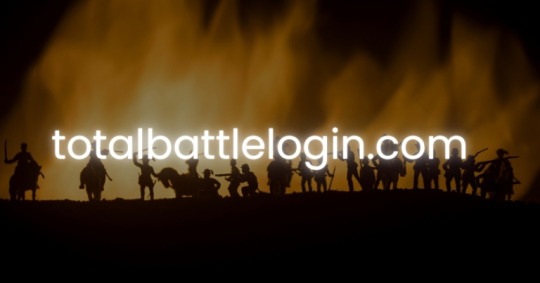
Welcome to the ultimate gaming experience with Total Battle, a strategic online war game that challenges your tactical skills while immersing you in a captivating medieval world. In this article, we’ll explore the essentials that every player needs to know, including how to navigate the Total Battle login process, maximize your gameplay, and delve into comprehensive guides that will elevate your strategies. Whether you're a seasoned general or just starting your journey, you’ll find valuable insights and tips to help you conquer your foes and build a formidable empire.
Total Battle Login
Accessing your gaming experience has never been easier with the total battle login. This streamlined process allows players to quickly enter the highly immersive world of Total Battle, ensuring that your journey toward strategy and conquest begins without delay.
Once you reach the total battle login page, you'll find an intuitive interface designed to facilitate your entrance. Whether you're a seasoned commander or a new recruit, you can swiftly log in using your credentials and pick up right where you left off in your quest for dominance.
In addition to great accessibility, the total battle login ensures your data protection and provides a seamless connection across devices. This means you can enjoy your favorite strategies on-the-go, enhancing your gaming flexibility and freedom.
Don't let obstacles stand in your way! Experience the thrill of Total Battle with a fast, reliable login process. Explore the possibilities at your fingertips – dive into engaging gameplay today with the total battle login!
Total Battle
Total Battle offers an immersive gaming experience that combines strategic warfare with resource management, making it a go-to choice for gamers looking for depth and excitement. The focal point of the game revolves around building your empire, forming alliances, and engaging in epic battles. Players can expect to dive into various gameplay modes designed to enhance their strategic skills and test their tactical abilities.
One of the significant advantages of total battle is its comprehensive total battle guide that aids both new and experienced players. This guide provides players with vital information on unit formations, resource allocation, and battle tactics, ensuring that you always stay one step ahead of your opponents. With regular updates and community contributions, this guide evolves alongside the game, maintaining its relevance and usefulness.
When you visit totalbattle, you are welcomed with a user-friendly interface that simplifies the login process, allowing you to jump straight into action. The platform is designed to be intuitive, making it easy for players of all skill levels to navigate and find helpful tools and resources that enhance their gameplay experience.
Join a thriving community of players who engage in strategic discussions, share their experiences, and dominate the battlefield. With Total Battle's dynamic gameplay and community-driven atmosphere, you will not just be a player— you will become part of a unified force aimed at conquering new territories and achieving glorious victories.
Total Battle Guide
Welcome to your ultimate total battle guide, designed to help you navigate through the exciting world of Total Battle efficiently. Whether you are a newcomer seeking to understand the basics or a seasoned player looking for advanced strategies, this comprehensive guide is here to enhance your gameplay experience.
Understanding Game Mechanics
Total Battle combines elements of strategy, city-building, and warfare. Familiarize yourself with the core mechanics to maximize your success:
Resource Management: Balance your resources like gold, wood, and food to ensure steady growth of your empire.
Unit Types: Learn about the various units available, including infantry, cavalry, and siege equipment, and understand their strengths and weaknesses.
Buildings: Upgrade your city by constructing essential buildings that boost your economic and military might.
Strategic Gameplay Tips
To gain an edge over your opponents, implement these tips into your strategy:
Scout Before Attacking: Always scout enemy positions to make informed decisions before launching an attack.
Join an Alliance: Collaborating with other players provides support and enhances your strategic options.
Daily Login Rewards: Make sure to log in daily to claim valuable rewards that will assist you in your quest.
Explore Tactical Features
The game offers various tactical features to gain dominance over your rivals. Mastering these can lead to significant advantages:
Hero Development: Develop your heroes by equipping them with powerful gear and leveling them up for enhanced abilities.
Battle Tactics: Experiment with different formations and tactics to find the best approach during battles.
Event Participation: Engage in special events that often yield unique rewards and opportunities for bonuses.
Utilizing this total battle guide will empower you as you embark on your journey in Total Battle. For further assistance or in-depth lore, don’t forget to check out TotalBattleLogin.com. Start your adventure today and conquer your foes with confidence!
Totalbattle
Discover the captivating world of Totalbattle, where strategy and action collide! Immerse yourself in the exhilarating gameplay designed to challenge even the most seasoned gamers. From building your powerful empire to forging alliances with other players, the Total Battle experience is ever-evolving and engaging.
The game seamlessly blends elements of classic strategy with modern features, ensuring that every session is unique. Whether you are a newbie or a veteran, the Total Battle guide is your essential tool for mastering gameplay tactics and optimizing your journey.
Accessing the game through the Total Battle login portal opens doors to exclusive events, rewards, and updates that keep the excitement alive. Enhance your gameplay experience by diving into rich lore and strategic warfare mechanics that Total Battle has to offer.
Join a vibrant community of players who share tips, strategies, and camaraderie in their quest for dominance. Don’t miss out on the opportunity to enhance your skills and achieve greatness. Take the first step by visiting Total Battle and preparing yourself for an epic adventure!
1K notes
·
View notes
Text









⠀˖⠀⠀⠀✶⠀⠀⠀JACK ABBOT TATTOO HEADCANON (wc : 1757) ˖ ✦⠀

Jack Abbot has one tattoo.
It covers nearly his entire back — thick black ink pressed deep into the skin, running from the base of his neck down the length of his spine. A gothic cross, built wide across the shoulders and heavy through the middle, the lines rough-edged from the start. Not sloppy — just deliberate. Meant to hold. Meant to last.
Behind it, broad wings stretch low and battered across the blades of his shoulders. No soaring angles. No graceful lift. The wings look like they've been dragged through hell and stayed standing anyway, snapped at the ends where scars have broken the ink, feathers ragged, blackening into the burn-scored skin.
It isn't a decoration.
It isn’t a statement.
It’s a brand.
It’s a map of a man stitched together out of survival and failure and the kind of duty no amount of discharge papers can strip out.
He got the cross first.
Late 2003. Afghanistan.
Jack had just finished his first back-to-back rotation.
He was twenty-seven and already carried himself like someone older — shoulders squared against the weight of shit he didn’t have the time or the luxury to process.
He wasn’t a grunt, not exactly.
Combat medics never are.
His job was to keep people alive long enough to die somewhere cleaner.
Tourniquets. Decompressions. Chest tubes jammed through ribs slick with blood and dirt. Dragging men out of wrecked Humvees with their legs hanging by threads. Holding arteries shut with bare hands. Telling men who knew better that they were going to be alright even when Jack could already see it in their eyes — the knowing.
When they died, Jack made sure the bodies went home right.
Flagged caskets. Dusty salutes on the tarmac. Honor, at least, if nothing else.
But what nobody told you was what stayed behind — the blood that didn’t wash out of the sandbags. The personal effects that never made it onto the inventory lists. The things they never trained you to carry.
He didn’t go out drinking with the others when they got home.
Didn’t crash motorcycles or get in bar fights trying to feel something.
Didn’t call his family, not even once.
Didn’t tell them he was back.
Instead, he drove forty miles outside of Columbus, Georgia in the middle of the night, past the closed gas stations and darkened diners, until he found the place someone in his unit told him about — a concrete block of a tattoo shop, all flickering neon and cracked windows.
The artist was an older guy. Ex-infantry. The kind of man who looked Jack over once and didn’t say anything stupid like, “You sure about this?”
Jack stripped off his jacket. Turned his back to the counter.
Said, flat and unflinching: "Cross. Centered. Big."
That was it.
No explanation.
He sat down in the chair and took the pain without a flinch, the buzz of the machine burning low into his bones.
Three hours.
No breaks.
When it was done, Jack paid cash and walked out without glancing at the mirror.
He didn’t need to see it.
He already knew it was there.
For a while, the cross was enough.
It wasn't about God. Jack stopped believing in anything higher than the people bleeding out in front of him years ago.
The cross was a mark. A ledger.
The weight of every body he couldn’t save.
Every face he couldn't scrub out of memory.
Every time he held pressure over a bleeding chest and knew it wouldn’t be enough but stayed there anyway because you don’t let go until someone else makes you.
The cross is the line between standing and falling.
Between duty and despair.
It’s what he chose when he realized coming home didn’t mean coming back clean.
A reminder that there are weights you carry even when nobody else sees them.
He didn't talk about it.
He didn’t show it.
He didn’t even think about it most days — the way you don’t think about breathing when you’ve done it long enough.
It just was.
Then Iraq happened. 2005.
Jack had been attached to a mechanized unit, running convoys through streets that changed loyalty every two hours.
He wasn't supposed to be in the blast radius.
Wasn't supposed to be on that street at all.
But orders change, radios go silent, and Jack went where he always went — where the bleeding was loudest.
The explosion ripped through the front of the convoy, tossing the first Humvee into the air like a kicked can and sending debris raining down onto the asphalt. Jack was moving before the dust even cleared, tourniquets slapping onto stumps, IVs jammed into collapsing veins, adrenaline and muscle memory dragging him forward.
He didn’t make it out clean.
He doesn’t remember the blast that took his leg.
Just waking up in a field hospital in Baghdad, throat raw, leg missing below the knee, an unfamiliar medic looking down at him and saying:
"You're still here."
Like that meant something.
Recovery was hell. Not because of the pain.
Jack could take pain.
It was the slowness that killed him — the waiting, the crawling pace of days stacking up like bodies you couldn’t bury.
Learning how to walk again wasn’t heroic.
It was survival, stripped down to its ugliest parts.
He got his prosthetic.
Did the work.
Moved forward.
Because there was nothing else.
When he was cleared to leave, Jack didn’t go home.
He went back to the shop.
Same cracked concrete. Same flickering neon.
Different guy behind the counter this time — younger, trying too hard to look tough.
Jack didn’t explain anything.
He pulled off his shirt.
Turned his back.
Pointed once at the black cross burned into his spine and said, voice low: "Add wings. Heavy ones."
No more words.
The artist didn’t ask what kind. Didn’t offer designs.
He just nodded, pulled on gloves, and started building them straight into the skin.
The machine buzzed steady over old scar tissue, dragging new lines over broken skin.
Jack sat through the whole thing in silence.
No grimacing.
No posturing.
No fucking catharsis.
Just pain.
Real. Clean. Useful.
They spread low across his shoulders, broken at the ends, snapped where the ink drags over old shrapnel scars.
They aren’t wings built for flight.
They’re built for burden.
Jack never wanted to soar.
Never wanted to be lifted out of the dirt and the blood and the endless fucking work of keeping people alive long enough to break again.
The wings carry weight.
The wings remind him — every time the prosthetic clicks against the tile, every time he feels the stitch of old wounds under new movements — that some things you don’t escape.
Some things you live with, whether you want to or not.
When it was done, Jack pulled his shirt back on and left.
Now, twenty years later, the ink rides over every scar the surgeons couldn’t smooth out.
The cross still holds fast over his spine.
The wings still stretch wide across his back, battered and blackened, torn at the edges by old shrapnel wounds and skin grafts.
He never touched it up.
Never will.
The breaks are the point.
The fact that it held together — not perfectly, but still standing — matters more than any clean line ever could.
Nobody at the Pitt sees it.
Not unless they catch him stripped down in the locker room after a shift gone bad — the kind where blood stains deep into the seams of his scrubs and there’s no pretending you can just walk out without washing it off.
Not unless they’re careless enough, stupid enough, to glance over at the wrong moment — when Jack pulls his top over his head with the sharp economy of a man who doesn't waste movement, exposing the thick black lines burned into the wreck of his back.
Even then, most of them don’t realize what they’re seeing.
They look away fast.
Learn not to ask.
Jack doesn’t invite questions.
He doesn’t offer answers.
He peels the ruined scrub top off, tosses it into the biohazard bin, and steps into the biting rush of the locker room shower — washing off blood that isn’t his, wounds he can’t name, losses too old to mourn.
The water stings where the skin splits open again along old scar lines, where the ink feathers into the broken places, but Jack doesn't flinch.
Pain is familiar.
Pain is simple.
He scrubs until the pink water runs clear.
Pulls on clean black scrubs with his back turned to the rest of the room, working around the ache in his knee, the stubborn old prosthetic that never fits quite right when the humidity climbs high.
The tattoo isn’t about grief.
It isn’t about forgiveness.
It isn’t about the dead.
It’s about what you bear when no one else will.
It’s about standing up when every goddamn inch of you has been telling you to stay down.
It’s about the blood you wash off and the blood that stays under your skin no matter how many times you scrub.
It’s about the debt you can’t ever pay back because there’s no one left to take the payment.
It’s about surviving when surviving means dragging the dead with you — not out of guilt, not out of penance, but because it’s what they deserve.
Because they deserved someone to remember.
And Jack remembers.
He remembers every tourniquet that slipped under his fingers.
Every heartbeat that flatlined under his palms.
Every name he never let himself learn because it was easier to bury strangers than brothers.
He carries them all.
Quiet. Heavy. Without complaint.
The tattoo rides the same way.
Not a badge. Not a wound. Not a plea for understanding. Just a part of him. Fixed in the bone. Written into muscle and scar tissue.
Same as the limp he pretends isn’t there.
Same as the uneven thud of his boot against the tile — a sound no one dares to call out.
Same as the empty silences he leaves between sentences, where everything real still lives.
Jack carries it.
Has carried it for twenty years.
Will carry it for twenty more if that’s what’s asked of him.
Without complaint.
Without prayer.
Without hope.
Because that's what you do when the cost isn’t yours to decide. When you survive and you shouldn’t have.
You carry it.
You stand up.
You move forward.
And you never, ever forget.
Even when the rest of the world does.
#trying to see if i like the element of the pics/gifs#i think it sets the scene?#ALSO PLEASE IF U DONT AGREE.... its my headcanon... look away#hes fictional#jack abbot#jack abbot fanfiction#the pitt fanfiction#the pitt#the pitt hbo#the pitt x reader#jack abbot x reader#dr abbot#dr abbot x reader#shawn hatosy
352 notes
·
View notes
Text
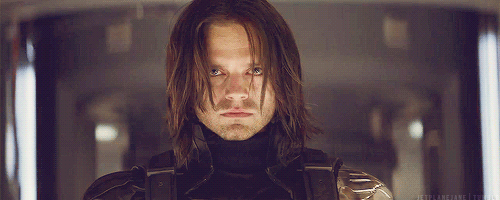
Taglist: @jozzieblood @buckysteveloki-me @dragonoftheshadows @plaidconvers @kateawolf13 @keira-kaz2y5 @frog-fans-unite @doilooklikeagiveafrack @verynormalsstuff @nynxtea @iminyourceiling @seventeen-x @mgchaser @y0urgirl @lovely-seb @laughterafter @mysuperlaserpissnumber1fan @irasciblemogwai @svtbpbts @vivalas-vega
------------------------------------------
A/N: their where a number of people that asked to be tagged in this story, if you have not been tagged but asked, please let me know and I'll add you.
💙
I think I got everyone !
------------------------------------------
Tw: Cussing, frustration,
Part 4
Words of Command - Part 5
The sun slants through the high glass windows, streaking the living room with warm, gold light. It should feel comforting, domestic, but instead there's a chill in the air—an invisible line drawn by uncertainty.
Stark Tower’s furniture gleams, but there’s a lingering tension in the room, like it remembers too many arguments and too few reconciliations.
Steve sits on the edge of a sleek leather chair, a worn cardboard box open at his feet. The contrast is stark—1940s brown and battered, resting on a pristine Stark-designed rug.
The box holds the last pieces of James Buchanan Barnes.
Photographs.
Dog tags.
A battered 1st edition book.
A faded Brooklyn Dodgers cap.
Cracking leather gloves.
You sit cross-legged on the floor, beside Bucky—he hasn't moved since Steve began setting out the items. His body is coiled, posture upright and too still.
His vibranium fingers rest against his thigh, flexing once every few seconds with mechanical precision. Not curiosity—just control.
Steve picks up an old photograph. Him and Bucky, arms slung around each other in their uniforms, both smiling wide, unburdened.
“Remember this, Buck?” he asks softly, holding it up.
Bucky looks at it blankly. “No.”
“Your ma gave me this,” Steve tries again, hopeful but gentle. “You kept it folded in your coat pocket through all of ‘43.”
“No.”
Just that. Flat. Empty.
You reach into the box, brushing your fingers over cold metal—two dog tags, dull with age, the chain tangled.
“James Buchanan Barnes,” you murmur aloud, reading. “107th Infantry.”
You don’t even think about it—you’re absently twisting the tags between your fingers, letting them sway gently as you examine the etched letters.

Behind you, the Bucky’s head tilts slightly. His gaze follows the motion, a slow tracking—not recognition, but something else.
Tension.
Steve catches the look, his hope reigniting. "They’re yours Buck, You used to tap them against your knuckles when you were thinking. You even—”
Bucky’s expression tightens. Subtle, but unmistakable.
His voice cuts through like a gunshot.
“Stop.”
You freeze, the dog tags dangling mid-air.
Steve sets down the photo. “Buck, it’s okay—”
“I don’t know these things.” His tone is clipped, his breath beginning to hitch. “They mean nothing.”
“But they’re yours,” Steve insists, stepping forward.
Bucky flinches back. It’s the most human thing you've seen him do.
“They are not mine.” There’s a tremor in his voice now, shaking beneath the metal. “That name—” He gestures toward the tags, fingers curled like claws. “—is not mine.”
The silence is fragile.
Then, suddenly—CRACK.
Bucky surges to his feet, the coffee table exploding beneath the force of his boot and metal arm. Splinters fly across the room.
You scramble back instinctively, heart hammering. Steve raises arm protectively in front of you and himself without thinking.

Bucky stands over the wreckage, chest heaving. His arm gleams—the plates shifting and whirring subtly like a beast under his skin. His eyes are wild, lost, locked somewhere deep within that isn’t here.
Not Brooklyn.
Not Stark Tower.
Not now.
“Doll?” he murmurs, searching.
“I—I’m here,” you say, slowly standing, your voice shaking only slightly. You cross the short distance, to stand beside his towering figure, and reach your hand out—not to touch, just to be seen. “I’m here. You’re not in danger.”
His breathing slows. Bit by bit. The metal arm lowers.
He doesn’t look at Steve. Only you.
“Don’t… don’t show me things,” he mutters. “They hurt.”
Steve kneels beside the broken table, his hand brushing a shard of wood.
“I thought it might help,” he says quietly. “I thought maybe... he'd feel something.”
You don’t have the heart to respond. Not yet.
Bucky sinks down beside you on the couch like a puppet with cut strings, his head bowed.
“I don’t want the name,” he mutters. “Don’t want their memories.”
“You don’t have to take anything you don’t want,” you whisper. “You don’t have to be anything but what you are right now.”
He looks at you. The sharpness in his eyes dulls, just for a moment.
“Doll,” he breathes, softer now. A single word. A tether.

The sharp scent of wood lingers in the air as you kneel down beside the broken coffee table, carefully gathering scattered fragments.
Your fingers ghost over jagged edges, mindful of catching a splinter. The sunlight pools across the floor like honey, warm and gentle—utterly at odds with the tension lingering in the room.
Bucky stands still a few feet away, silent, coiled like a spring. His metal arm reflects the light in soft, rhythmic pulses as he flexes and unflexes his fingers.
He’s watching you again—hyperaware, always alert.
He hasn't moved to help, but you sense it’s not indifference—it’s wariness. Confusion. Waiting for a command.
Steve is pacing nearby, eyes flicking between you and his oldest friend.
“Buck,” Steve says again, trying to soften his tone. “C’mon, you have to remember. That name—it’s yours.”
Bucky’s eyes shift slowly toward him. “No.”
Steve runs a hand through his hair, frustration mounting behind his quiet grief. “Bucky. James Buchanan Barnes. You were—my best friend —hell, you are—you might as well be my brother.”
Bucky's jaw tightens. His voice is sharp, strained. “I said no.”
You rise slowly from the floor, gently setting a handful of splinters on the side table.
You don’t move too quickly.
You’ve learned that his stillness isn’t peace—it’s the calm before something breaks.
You take a slow step between them, placing your hand lightly on Steve’s forearm.
“Steve,” you murmur, your voice quiet, apologetic.
“He might not be ready for that.”
He looks at you like he wants to argue, but something in your eyes stops him. He sighs, stepping back. Not defeated—but wounded.
You turn to Bucky, your posture softening—shoulders lowered, eyes gentle, voice so quiet you barely hear it yourself.
“You don’t have to be who anyone says you were.”
His eyes flicker—curious, not yet understanding.
You shift your weight, folding your hands in front of you. “What do you want to be called?”
There’s a long silence.

Bucky doesn’t answer right away. He looks down at his feet, then over at the shards of the table. Then back at you. His brows draw together.
You can see him thinking—not just reacting. That alone feels like a victory.
Finally, he speaks.
“Soldat.”
One word.
No hesitation.
Your heart twists a little. It's not what Steve wanted to hear. Maybe not even what you hoped for. But it’s his choice.
You nod slowly. “Okay, Soldat.”
The way his body eases—not visibly, but subtly—tells you it was the right move.
His eyes linger on you, not searching for approval, but grounding.
Steve watches this exchange in quiet disbelief. There’s pain in his face, but he masks it quickly. He turns his gaze to the window, jaw clenched.
You move to pick up more debris. Bucky watches for a beat longer, then quietly steps forward.
“Doll,” he says, voice lower, uncertain. “...You want this cleaned?”
You look up, surprised, and smile gently.
“No, it’s okay. I got it.”
He hesitates, shoulders twitching faintly, like he’s fighting the instinct to obey or to stay alert. But when you don’t issue another command, he simply nods once and stands silently beside you. Not helping. Just being near.
Steve crouches beside the box of Bucky’s things again, but doesn’t touch anything this time.
“I thought maybe hearing his name would bring something back,” he says softly. “That maybe some part of him was just... waiting.”
You glance at him, your heart aching for both men in different ways.
“I think he’s trying,” you reply just as softly. “But he’s scared. He doesn’t know who he is is yet.”
Steve doesn’t answer. But he doesn’t argue either.

The couch beneath you is just a little too plush, the kind that swallows you whole, and you’re curled up on one side with a knitted throw across your lap. The TV glows warmly in the dimmed lighting of the shared lounge in Stark Tower.
Steve had chosen an old black-and-white romance—Casablanca—murmuring something about nostalgia. The kind of story that used to make people believe in fate and sacrifices.
Bucky sits on the far end of the couch, rigid, alert, back never fully touching the cushions. His vibranium hand rests on his thigh, the fingers twitching occasionally, as if uncomfortable being still for this long.
He hadn’t wanted to sit at first.
You had to quietly ask him.
Not order—but suggest.
Gently. Like you were taming a skittish animal.
And still, he only did it because you asked.
Steve sits in the armchair nearby, watching the screen—though he steals glances at the man who was once his best friend.
You try not to stare, but your gaze flickers to Bucky, to the faint slouch in his shoulders when the film softens. He’s not watching the action.
His eyes are fixed on the interaction between the leads—Ilse and Rick.
There’s something hesitant in the way he watches them, like he's seeing a language he used to know.
And then it happens.
Ilse says Rick’s name—soft, broken with affection—and touches his cheek. Onscreen, it’s romantic. Longing.
Beside you, Bucky flinches.
It’s so slight, you almost miss it. His brow twitches. The corner of his mouth pulls down. His jaw clenches tight, and his hand—the flesh one—lifts a few inches, as if reaching for something that isn’t there.
“Doll,” he murmurs quietly, the Brooklyn cadence slipping through like it was never forgotten, his voice a bit above the sound of the movie. “I know that.”
You turn to him, heart in your throat. “What do you know?”
He doesn’t answer. Just shakes his head once, sharply, like trying to shake off a memory that hasn’t fully formed. His metal fingers curl tight into his leg.
“Soldat,” you say gently, tilting toward him, “It’s okay. You don’t have to—”
But he interrupts. Not with words—just a look. Frustration. Something like fear. He doesn’t want to forget. He just can’t remember.
Steve’s voice cuts softly across the silence.
“You know,” he says, lips twitching with bittersweet fondness, “he used to be the biggest flirt in Brooklyn.”
You blink in surprise.

Steve chuckles dryly. “Seriously. Bucky Barnes couldn’t walk down the street without giving some poor girl whiplash. He used to say the army gave him a uniform just so he could have an excuse to wink at nurses.”
You glance back at Bucky.
His expression hasn’t changed. But his shoulders tense, just slightly. The name doesn’t spark recognition—but the words? They linger. Maybe deep down, they ring true.
He doesn’t say anything. But you think he’s listening more intently now.
"Were you a heartbreaker?” you ask, voice amused.
Bucky looks at you, just for a moment. His eyes search your face, and for the first time, there’s a ghost of something there.
Maybe confusion.
Maybe curiosity.
Maybe even shame.
His mouth opens like he might say something—
—but then he closes it. Shakes his head once. “Don’t know.”
But his voice isn’t as flat this time. It’s uncertain.
You notice the way he shifts a little closer on the couch. Not enough to touch, but enough to feel your warmth. He hasn’t done that before.
You don’t press it. You don’t need to.
Instead, you settle back against the cushions, letting the movie wash over the three of you.

The film is long over, the credits a soft blur in the background as the three of you remain in the cozy dim of the common room.
The quiet has settled comfortably around you, broken only by the sound of Steve shifting in his armchair and you gathering the courage to speak again.
“I… Steve?” you begin softly, still cradled under your blanket.
He lifts his head. “Yeah?”
“Can you tell me more?” You gesture a little toward Bucky, who sits across from you now, perched on the edge of the couch like someone waiting for orders. “About… back then. About Bucky.”
Steve hesitates, eyes flicking toward the man who used to be his best friend. There’s sorrow there. But he nods.
“Sure,” he says. “Back in the 40s, Buck was... well, he had this way about him. Real smooth. He was the kind of guy dames lined up for.”
You pause, blinking. “...Dames?”
Steve grins slightly at your puzzled expression. “Yeah, it was what we called women back then. Girls. Ladies. ‘Dames,’ ‘broads’—kinda like saying 'chicks' now.”
You blink again. “That sounds so weird.”
From the couch, Bucky makes a faint sound in his throat—almost like a scoff. You glance over.
He mutters, “Dames.”
Steve’s eyes widen slightly. “You remember that?”
Bucky doesn’t acknowledge it. He just lowers his gaze to the floor, jaw set tight again.
Steve leans forward a little, voice softening. “He used to take me out to dance halls. He’d charm the whole room and I’d just be the friend tagging along. But Bucky? He could make a girl blush with just a look.”
You peek at Bucky again, just a glance, before returning your attention to Steve “Really?”
Steve chuckles. “Oh yeah. He used to run his fingers through his hair like it was a signal. Girls’d go nuts. He’d smile with this crooked little smirk. Talk slow. Confident. The guy had a whole routine.”
You tilt your head, curiously. “Did he have a catchphrase?”
Steve laughs again. “Not really. Just… ‘You ever dance with a soldier?’ That kind of thing.”
You glance back at Bucky, amused. “Did you really say that?”
This time, he looks at you. Right at you.
"Maybe,” he says simply.
The fact that he responds at all has both you and Steve frozen for a second.
Then he blinks, confused. Like he didn’t even mean to answer.
You press a little, just to see.
“What else did you say?”
He frowns. Shakes his head slowly. “Don’t know.”
But it’s there. A flicker. Like a coin caught in the light before it disappears again.
The cadence is different now, less monotone.
The voice of someone still trapped behind years of conditioning, yes—but also the accent of a man who once teased girls in diners and danced to swing records under cheap lights.

You shift a little on the couch, your frame pulled upright now, legs tucked beneath you.
Bucky tracks the movement, his head tilted slightly, like you’ve shifted the center of gravity in the room.
He doesn’t touch you.
But when you lean forward slightly to adjust you sock—his flesh hand twitches on his thigh. A response to proximity.
Maybe comfort.
Maybe confusion.
Steve watches the entire exchange like someone seeing the beginning of something sacred.
He leans back, folding his arms.
“I remember once, Buck tried to flirt with this nurse by pretending he’d hurt his shoulder—”
“Didn’t work,” Bucky cuts in suddenly. Voice flat, but louder this time.
You both freeze.
“…You do remember?” Steve leans forward again, hope flashing in his face.
Bucky shakes his head, visibly irritated now. “Don’t know. Just… sounds wrong.”
His jaw locks. Muscles tense. The soft warmth of the moment vanishes. He’s retreating. You can feel it. Like someone slamming a door in a quiet house.
You speak gently.
“Soldat.”
He blinks, eyes immediately snapping to yours at the name. Focused.
You smile a little. “You don’t have to remember right now.”
“…Okay, Doll,” he replies after a beat, the words sounding more automatic now—but still, there’s something a little softer about the way he says Doll tonight.
#bucky fanfic#bucky barnes marvel#bucky x you#bucky x reader#james bucky buchanan barnes#marvel fic#marvel fanfic#marvel#marvel mcu#mcu fandom#marvel fandom#marvel x you#marvel x reader#winter soldier x you#the winter solider x reader#the winter solider fanfiction#winter soldier x reader#the winter soldier#winter soldier#winter solider x reader
293 notes
·
View notes
Note
If I could ask you for some advice, what do you think helps the flavour text of a mech or piece of equipment sell a player on the fantasy of using it?
I'm finding it frustratingly difficult to do so with my own homebrew content: I can come up with lore and backstory easily enough, but re-reading it feels dry, and I can't help but contrast it with how the descrptions in official content and other supplements is more evocative, at least for mechs.
Let's observe some corebook Lancer flavour text and examine the various varieties it comes in.
Purely Functional

While it's usually not the most fun type of flavour text, this just tells us what the weapon is, and - if it has any particular tags or on-hit effects - why it's like that. The Hand Cannon is a good example: here's what it is (modified pistol), here's why it does more damage, and here's why it has Loading.
The main advantage of Purely Functional flavour text is that it provides space for other types of flavour text to breathe. Flavour text is a great place for jokes, but it's not good for every piece of flavour text to be a joke - the pauses between notes in music are just as important as the notes.
Obfuscating Vendorspeak
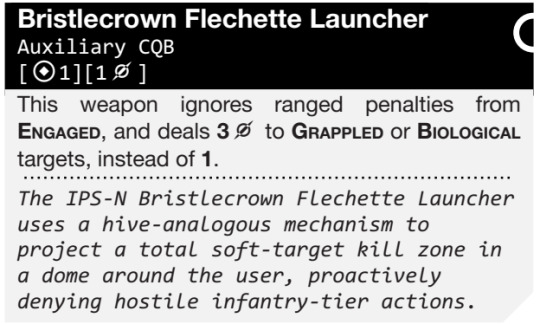
The Bristlecrown Flechette Launcher this is a great example of dark humour that Lancer uses quite often: marketing fast-talk to cover up something really unpleasant. The joke here is based on us understanding precisely what the equipment does mechanically, and then seeing how the manufacturer tries to sell it. There's a bunch of dense technobabble here meant to obfuscate the fact that this weapon fires knives in every direction specifically designed to kill infantry.
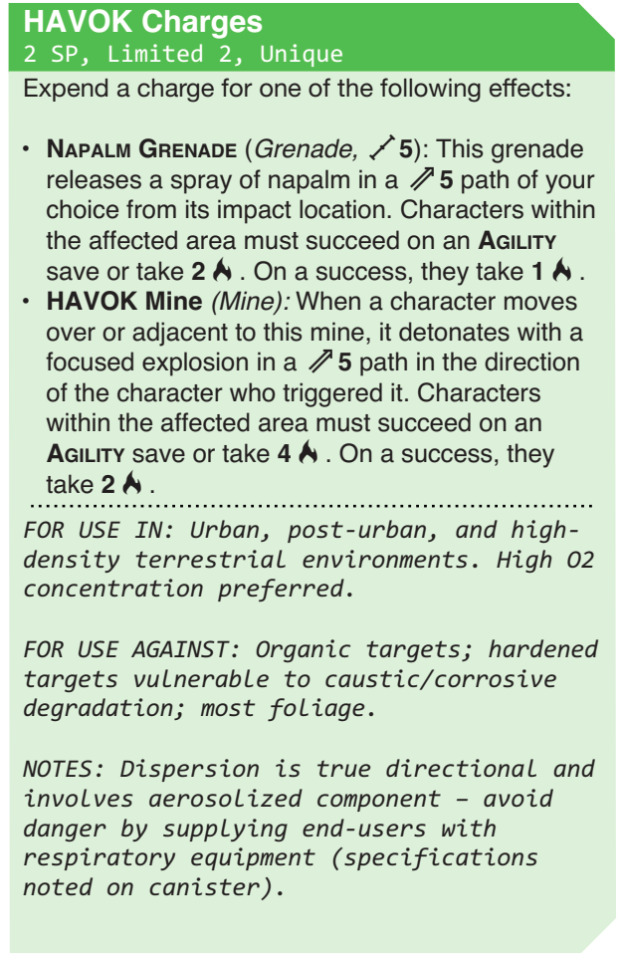
Deadpan Weirdness

The joke here relies on describing something extremely weird like it's the most natural thing in the world. Wait, you're telling me that in a world where I can just print new parts if the old ones break, they put DRM on my fucking knife and I have to apologise to the fucking knife maker to get a new one? What the fuck, dude? Why are you acting like this makes any sense?!

My sword uploads fucking what to the Space Internet?!
Third-Act Twist
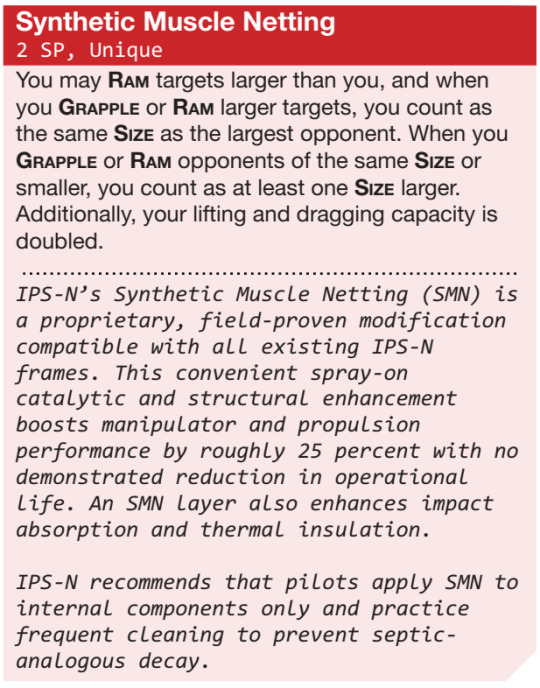
This type of flavour text disguises itself as something else - most often Purely Functional - and then hits you with Third Act Twist. It makes you go "wait, what?!" It's very classic setup-punchline stuff. You're telling me my mech can rot?!
As a side note, Lancer loves to use this for its NHPs.

WHY DID YOU PUT THAT IN SCARE QUOTES, LUCIFER
Worldbuilding
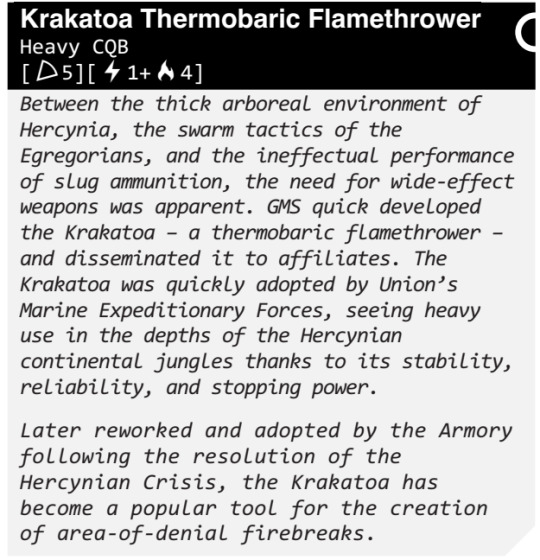
This is similar to the Purely Functional, but instead of just describing technical specifications of the weapons, it puts the weapon in the broader context of the setting's history. Okay, so we know what this weapon is and what it does - why was it built? What was the original use case, and why? Most importantly, what can the existence of this weapon tell us about the world that build it?

Whimsical Aside
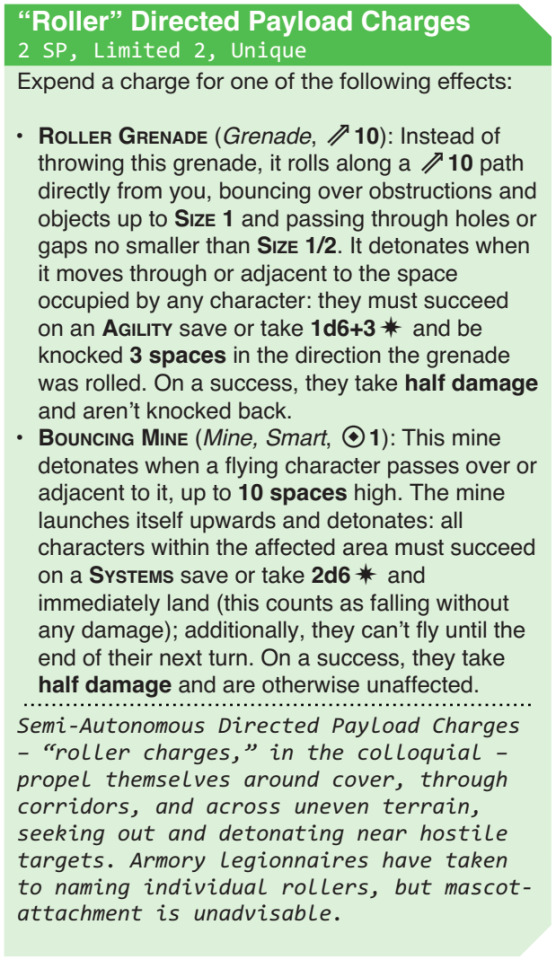
This is the insertion of a light-hearted, humanising little insertion regarding how this piece of equipment gets used in the field. This serves to remind us that soldiers aren't cold, unfeeling killing machines: they can be as emotional, irreverent and silly as the rest of us, and they do things like name their mobile bombs...
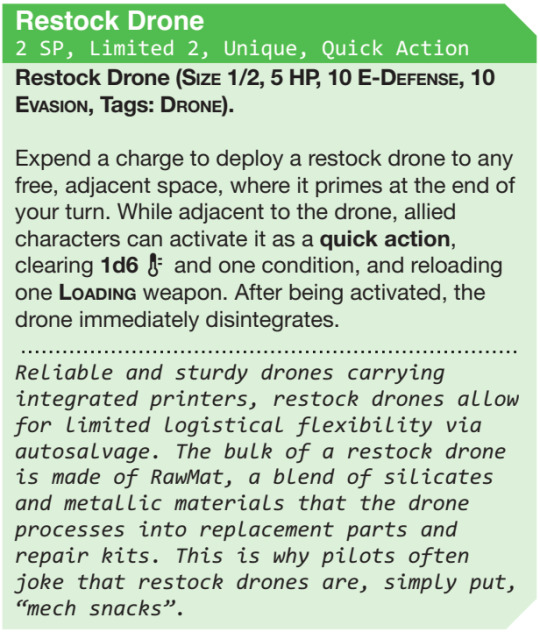
... or call resupply drones "mech snacks."
The Ominous Out-Of-Context Quote That Explains Nothing And Only Raises More Questions
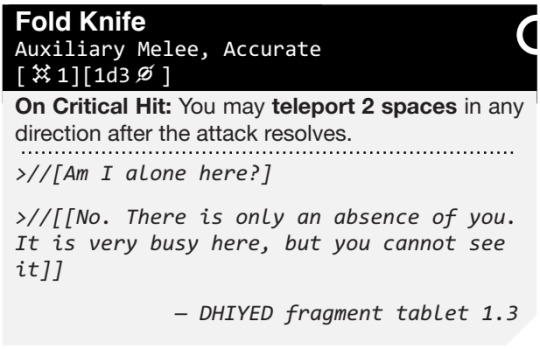
As I've said in multiple textmash memes, this is basically Tom and Miguel's shorthand for "this technology is Intensely Fucked Up in a way that it is more fun and scary not to explain." This is essentially Lancer's version of SCP's [REDACTED].
You might think this is the domain of HORUS, and you'd be right, but every single manufacturer indulges in these - although IPS-N had to wait until NRFaW to get theirs:
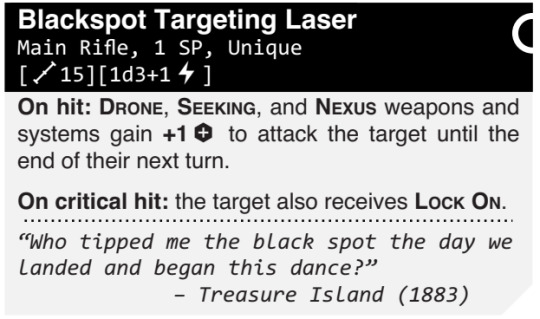
What the fuck do you mean by that, Lancer?
638 notes
·
View notes
Text

˙ ✩°˖ ✈️ world.execute (us) ; / caleb x reader
synopsis; specially designed weapons X-01 and X-02 breach established program; enter world execution protocol.
🍎 pomme's notes — sorry this is super abstract heh but CALEB! COME HOME TO ME BABY PLEASE! also i quoted bible verses but tweaked them to fit the lads cinematic universe.. i love biblical imagery in the media i consume 🙂↕️
⋆ 500 words / god knows what genre ummm let's say angst (..?) to be safe / fem reader / 2nd person
— and of the wing which EVER had taken from X-02, they made X-01 and brought her to X-02.
weapons. it is all that they were.
disposable machinery, circuits, and welded metals deemed unable to exercise primary human functions — possessing a conscience, feeling, and refusing orders.
world.addThing (caleb) ;
X-02 was the first successful weapon after a series of experiments. dubbed 'caleb' by the researchers, he wielded the power of gravity and was the strongest of their arsenal — mechanical wings giving him the appearance of an angel, flawless robotic being, harbinger of an unspoken world ending.
world.addThing (you) ;
from his steel feathers and wires, they made X-01 — caleb's eve. on her own, she was but a standard infantry soldier, if only more resistant to damage and irreplaceable in her resilient quality. however, when coupled with caleb, they made for the ultimate weapon of mass destruction.
an ever growing black hole contained within pandora's box, one which she held the key to — a limitation imposed onto caleb's infinity.
if (you instanceof Sequence){
you.setlimit (caleb.toLimit());
}
when unsupervised by researchers, X-02's standard protocol was a simple one — destroy X-01.
world.execute(you) ;
however, within the lines of codes, caleb's processor encountered a critical error upon attempting to execute the function. similar to how eve was made from adam's rib, X-01 was made from caleb's wing — thus, the function was rendered useless, as it translated to self-destruction,
world.execute(caleb) ;
further down the lines of 1s and 0s, though, an even more critical error manifested itself — within both weapons' codes. they were capable of feeling.
a desire for the other's warmth.
a foreign concept within their program.
in the midst of their self-imposed fall from grace, one brought on by their own faulty parameters, they reach for each other's hands.
caleb's hand clasping X-01's, bringing her to his chest, going against every established program within his system. in his processor, only one command rings loudly — a corrupted line of code? or a virus, maybe? unable to be purged by his safety protocols, caleb's newly found virtual conscience displays only one function to execute.
world.unite(you, caleb) ;
and like the machine he was programmed to be, he abides by this newly established function — one catalyzed by your very being in his vicinity.
joining your lips together, he finds comfort in the unnatural warmth emanating from your composition.
— ILOVEYOU
weapons. designed for each other's annihilation.
in life, in binary or in one's warmth,
and in death, in circuits shutting off or stopped heartbeats,
even if it all fades away — your souls will resonate with one another's.
world.execute(us);
— so EVER banished them from the garden of eden and sent caleb out to destroy the fabric of the universe from which he had been made — his eve by his side to fall with him.

🍎 pomme's notes — i do not code the code lines come from this song by mili called world.execute(me) (also the title of this thing)!! IT'S SOOOO MYTH CALEBMC CODED PLEASE LISTEN TO IT I BEG
#⋆ pomme rambles#caleb#caleb x reader#caleb x you#lads x reader#lads caleb#lads#love and deepspace x reader#love and deepspace#⋆ neigepomme#i'm half asleep this might be ass if it is. we die like men#pomme “i'll go to bed before 4 today” neige#it's 4am. Yeah. Whatever live laugh love caleb
193 notes
·
View notes
Text

Mechanized Urban Infantry
587 notes
·
View notes
Text
A fun thing I noticed about Flying Circus and its Chariots of Steel expansion is that in both systems combat is extremely isolating, but they isolate in opposite ways.
Combat in Flying Circus is agoraphobic (or more accurately it is kenophobic). You might be part of a team, but you are alone in a vast blue void. It's so big that getting lost in a clear sky is a genuine possibility. Things appear as if from nowhere and disappear the moment you take your eyes off them. Someone who was in your gun sights one minute might be on your tail the next, and you have no idea how they got there. Even if you are lucky enough to have a backseater, you can't really talk to them unless you shell out for an intercom. Unless everyone installs expensive and bulky radio equipment you can't talk to the rest of your team either. If things go far enough off script you can literally go down in flames and your friends won't know until they find your smoking crater...if they ever do.
In contrast, Chariots of Steel is claustrophobic. If you are a tanker, you are stuck in a cramped metal box. You can't hear anything over the engine, and you can barely see anything out of the tiny vision slits. Sure you have crew, but unless you pay extra for an intercom your only means of talking with your crew will be strategic kicks. Infantry have it just as bad. Soldiers in the open are better known as "target practice", so you'll spend a lot of time huddled behind stuff with your head down, praying that there isn't someone sneaking closer with a grenade. This status quo of blind terror is enforced through the Suppression and Morale mechanics, which are critical to how fights work in CoS.
The extent of this isolation is obviously going to vary based on the tone of your game, but it's baked into the rules of both systems. Even figuring out where people are and what is going on usually requires a roll, and communication is complex and crude unless you jump through a lot of hoops. Teamwork is still possible and often key to success, but this isn't D&D where everything is laid out neatly on a grid and talking is a free action. When the bullets start flying it's just you and your instrument-shaped character sheet. You can't focus on the entire battle, just your little corner of it.
It's a truly unique approach, and I really like it.
224 notes
·
View notes